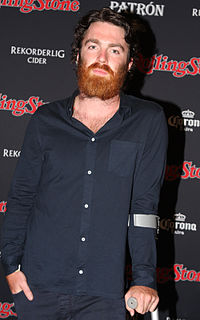A Quote by Maggie Gyllenhaal
Sometimes I'll read a script and think, "That's not how humans behave," or "I don't understand how to do that and make it seem like I'm not some kind of strange alien or on a sitcom." I don't get it, and when I feel that way, I have to listen to my instinct.
Related Quotes
Sometimes I'll read things in the script and think, "That's not how humans behave," or "I don't understand how to do that role and make it seem like I'm not some kind of strange alien or on a sitcom." I don't get it, and when I feel that way, I have to listen to my instinct. My initial instinct does lead me in a direction that I can trust.
I think that connection with humans is so important. Sometimes I'll do this monologue and talk to the crowd, like, 'Come on, let's really connect here.' I don't think a lot of people understand it's a two-way exchange. Some people go to a show and are like, 'Yeah, you make me feel.' That's not how it works.
To me, skin is alien and kind of weird; it weirds me out. It's strange, but it's also really intimate and personal; it's living, organic. That's how I want the music to sound; I want it to feel alien and strange, but also like it's got a heartbeat, like it's got a soul, like it's not made by a robot.
How would you feel if you had no fear? Feel like that. How would you behave toward other people if you realized their powerlessness to hurt you? Behave like that. How would your react to so-called misfortune if you saw its inability to bother you? React like that. How would you think toward yourself if you knew you were really all right? Think like that.
I think Memento movie was hard because people didn't get it, they just didn't understand it. Not from the stage when we read the script and liked it. It's sort of a famous story now how we finished the movie and showed it to distributors and nobody wanted it. So it wasn't just they didn't get the script, they really didn't even understand the movie when it was done. But I think that was a particularly hard one. I don't think it was harder because we were girls, but I do think obviously there are particular challenges to working in a male-dominated industry.
When you start out as an actor, you read a script thinking of it at its best. But that's not usually the case in general, and usually what you have to do is you have to read a script and think of it at its worst. You read it going, "OK, how bad could this be?" first and foremost. You cannot make a good film out of a bad script. You can make a bad film out of a good script, but you can't make a good film out of a bad script.
I think everyone is always asking themselves, How is my work meaningful, how is my life meaningful? As I get older, I feel like who I am as a person and a citizen is more important than who I am in my work. But I do think it reframed slightly for me, how much I have to care about a project in order to want to do it. Sometimes, obviously, you have a take a job for money. But I think I'm quicker now when I get a script that's, say, borderline misogynist, I'm not going to go in for it. I'm thinking more about what I'm putting into the world.
I had to audition for Fandango. When I read the script, the role that was interesting - so everyone thought - was the role that Costner played. He was the cool guy. And I read the script, and my representation at the time said, "That's the role you should read for." And I was like, "Really? How about I read for this other role." And they went, "Well, you're not going to get that role."
I always think it's interesting to switch genres, because if I read a script and I know exactly how to manifest a story, I don't really want to do it anymore, because I've already done it in my head. It becomes less interesting. If I read something that's challenging, I get really passionate and usually fall in love with it, because I feel I need to do it. I need to tell the story; I need to find a way to make it happen.
I do not understand how deeply people seem to like my work - but I love that people feel I have helped them through hardships, and also have shared my experience of living a more spiritual and present life. It's so great to be able to make people laugh, because this is so often how we get our selves back.



































